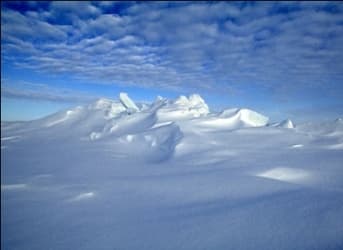Canada has thrown down the gauntlet to Russia with a claim of Arctic sovereignty that extends to the seabed under the geographical North Pole that Moscow also claims.
The prize is that the Arctic is believed to contain as much as 25 percent of the world’s undiscovered energy resources.
According to a 2008 U.S. Geological Survey, the Arctic holds an estimated 13 percent, or 90 billion barrels of the world's undiscovered conventional oil resources and 30 percent of its undiscovered conventional natural gas resources.
But much of this largesse has remained untouched because of a number of factors. The U.S. government’s Energy Information Administration notes, “Consideration of these resources as commercially viable is relatively recent despite the size of the Arctic's resources due to the difficulty and cost in developing Arctic oil and natural gas deposits. … Studies on the economics of onshore oil and natural gas projects in Arctic Alaska estimate costs to develop reserves in the region can be 50-100% more than similar projects undertaken in Texas.
Profitable development of Arctic oil and natural gas deposits could be challenging due to the following factors: equipment needs to be specially designed to withstand the frigid temperatures; on Arctic lands, poor soil conditions can require additional site preparation to prevent equipment and structures from sinking; long supply lines and limited transportation access from the world's manufacturing centers require equipment redundancy and a larger inventory of spare parts to ensure reliability, while increasing transportation costs; employees expect higher wages and salaries to work in the isolated and inhospitable Arctic and natural gas hydrates can pose operational problems for drilling wells in both onshore and offshore Arctic areas.”
At issue is each country's competing claim to its Exclusive Economic Zone (EEZ) under the Third United Nations Convention on the Law of the Sea (UNCLOS), which came into force in November 1994. UNCLOS Part V, Article 55 defined an “exclusive economic zone” (EEZ) for countries with maritime frontiers as extending 200 nautical miles from a nation’s coastline. Both Russia and Canada have signed UNCLOS, but the treaty is murky on the Arctic dispute, as a nation can secure control of the ocean floor beyond the internationally recognized 200 nautical mile limit if it can demonstrate the seabed is an extension of its continental shelf.
Accordingly, Canada is preparing documentation to be submitted to the UN Commission on the Limits of the Continental Shelf. Besides the North Pole, and Arctic seabeds Canada is claiming sovereignty areas of the Atlantic Continental Shelf off its eastern coast, but there is no extended continental shelf Canada can claim in the Pacific Ocean.
According to Dr. Jacob Verhoef, Canada's head of Arctic mapping, "Presently, Canada is on track to prepare and submit its outer limits of the extended continental shelf and substantiating information to the UN Commission by its deadline of December 2013."
Canada filed only a partial submission to the UN Commission on the Limits of the Continental Shelf by the 6 December deadline, waiting until scientists can gather sufficient data to back up this territorial expansion to submit a full application. Research yet to be completed includes mapping the underwater Lomonosov Ridge, which the government of Prime Minister Stephen Harper believes would effectively link Canada to the North Pole. On 9 December Canadian Foreign Affairs Minister John Baird told a news conference, “We have asked our officials and scientists to do additional and necessary work to ensure that a submission for the full extent of the continental shelf in the Arctic includes Canada’s claim to the North Pole.”
And how is Russian President and Supreme Commander of Russia’s military Vladimir Putin responding to this? At a 20 December meeting with Russia’s Ministry of Defense Putin told his audience during a long speech that Russia would focus upon and strengthen its presence in its Arctic territory, stating that Russia must have "all the levers to protect its security and national interests" in the Arctic, adding that the Ministry of Defense should "pay special attention to infrastructure deployment and military units on the Arctic direction" before concluding that Russia today is "increasingly developing this promising region…" . In reply, Russian Defense Minister Sergei Shoigu assured the Supreme Commander that already this year forces have been deployed in the Arctic tasked with protecting national interests there.
Russia intends to make a similar application to UN Commission on the Limits of the Continental Shelf.
Accordingly, it will be interesting to see if in its competing claims Canada will choose either Russia’s diplomatic carrot or military stick.
By. John C.K. Daly of Oilprice.com



















We're still hooked on oil. Arctic sourcing will be one of the most challenging environmentally and politically.
Where will this quest for "tough oil" all around the globe end? And at what cost? You can figure that cost in what we pay today. You might throw in some external costs that we pay later or somewhere other than at the pump. And you might look at what future generations, like my grand kids, will pay.
Same with the Enbridge pipeline. Petro-China put in a bid, to help build the Enbridge. Nothing there for Canadians and especially nothing, for the people of BC, only the risk.
Not only does Red China own our resources? China also takes the resource jobs as well.
Harper may very well need his, Communist China Army